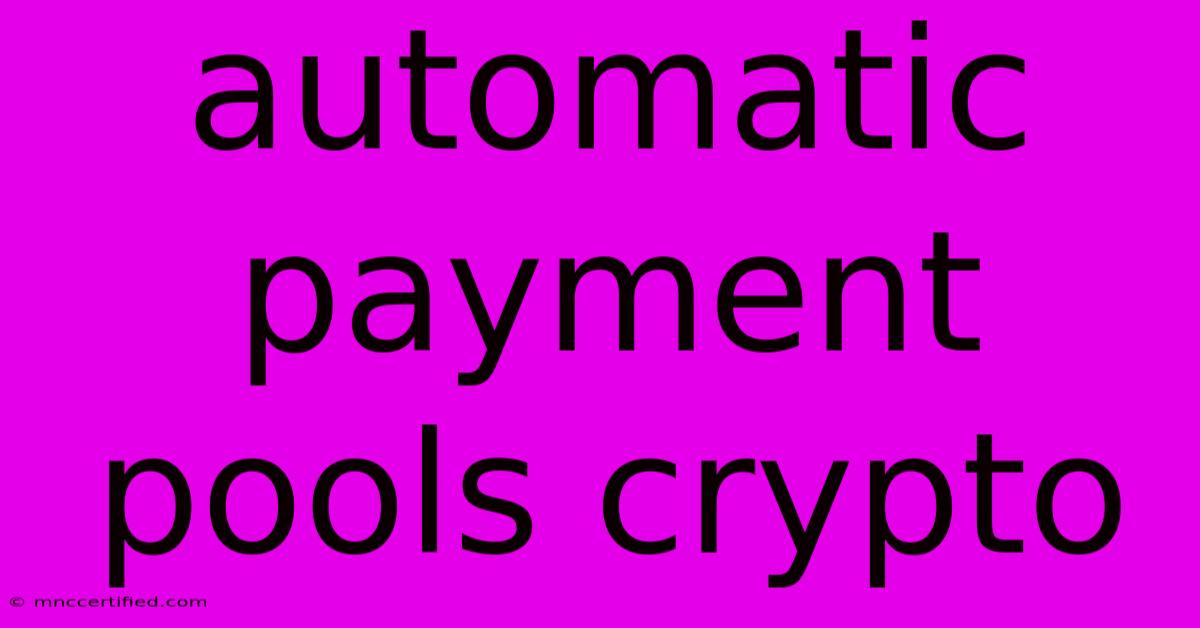Automatic Payment Pools Crypto

Table of Contents
Automatic Payment Pools in Crypto: Streamlining Payments and Enhancing Liquidity
The cryptocurrency landscape is constantly evolving, with new innovations emerging to improve efficiency and user experience. One such innovation is the automatic payment pool, a system designed to automate and optimize the process of receiving and distributing cryptocurrency payments. This article delves into the mechanics of automatic payment pools, exploring their benefits, limitations, and future potential.
Understanding Automatic Payment Pools
At its core, an automatic payment pool is a smart contract-based system that aggregates multiple incoming cryptocurrency payments into a single, larger pool. This pooled amount is then automatically distributed according to predefined rules and parameters, often based on percentages or weighted allocations. Think of it as a sophisticated, decentralized escrow service with automated disbursement.
Key Features of Automatic Payment Pools:
- Automation: The most significant advantage is the elimination of manual payment processing. Funds are automatically received, pooled, and distributed, reducing human error and delays.
- Transparency: All transactions are recorded on a public blockchain, providing a transparent and auditable trail for all participants.
- Security: Smart contracts ensure that funds are securely held and disbursed only according to the pre-defined rules, minimizing the risk of fraud or manipulation.
- Efficiency: By consolidating payments, automatic payment pools reduce transaction fees and processing times, especially beneficial for high-volume payment scenarios.
- Liquidity: The pooling of funds enhances liquidity, making it easier for participants to access larger amounts of cryptocurrency when needed.
How Automatic Payment Pools Work
The process generally involves these steps:
- Setup: A smart contract is deployed on a blockchain, defining the rules for payment allocation, participant addresses, and distribution percentages.
- Payment Collection: Users send cryptocurrency payments to the designated smart contract address.
- Pooling: The smart contract accumulates incoming payments into a single pool.
- Distribution: Once certain conditions are met (e.g., a minimum pool size or a specific time interval), the smart contract automatically distributes the pooled funds to the designated recipients according to the predefined rules.
- Auditing: The entire process is transparently recorded on the blockchain, allowing all participants to verify the transactions.
Benefits of Using Automatic Payment Pools
- Reduced Operational Costs: Automation minimizes the need for manual intervention, reducing labor costs and processing fees.
- Improved Efficiency: Faster payment processing streamlines operations and improves overall efficiency.
- Enhanced Security: Smart contracts provide a secure and tamper-proof mechanism for handling funds.
- Increased Transparency: Blockchain technology ensures full transparency and accountability.
- Scalability: Automatic payment pools can handle a large volume of transactions, making them suitable for businesses of all sizes.
Limitations and Considerations
- Smart Contract Risks: Bugs or vulnerabilities in the smart contract code could potentially lead to loss of funds. Thorough audits are crucial.
- Blockchain Fees: While pooling reduces transaction fees overall, blockchain transaction fees still apply to the initial deposits and final distributions.
- Complexity: Setting up and managing automatic payment pools requires a certain level of technical expertise.
- Regulatory Uncertainty: The regulatory landscape surrounding cryptocurrencies and smart contracts is still evolving, posing potential legal challenges.
The Future of Automatic Payment Pools in Crypto
Automatic payment pools represent a significant advancement in cryptocurrency payment infrastructure. As the technology matures and regulatory clarity emerges, we can expect to see wider adoption across various applications, including:
- Decentralized Finance (DeFi): Integration with DeFi protocols to enable automated yield farming and lending strategies.
- Supply Chain Management: Tracking and managing payments throughout complex supply chains.
- Micropayment Systems: Facilitating small, frequent payments for digital content or services.
In conclusion, automatic payment pools are a powerful tool for streamlining cryptocurrency payments, offering significant benefits in terms of efficiency, security, and transparency. While limitations exist, ongoing developments and improvements in smart contract technology promise to further enhance the capabilities and adoption of this innovative solution. By understanding the intricacies of this technology, businesses and individuals can harness its potential to revolutionize their financial operations in the cryptocurrency space.

Thank you for visiting our website wich cover about Automatic Payment Pools Crypto. We hope the information provided has been useful to you. Feel free to contact us if you have any questions or need further assistance. See you next time and dont miss to bookmark.
Featured Posts
-
List Of Mgu Insurance Companies
Nov 26, 2024
-
The Bonds That Tie Bookish Box
Nov 26, 2024
-
Watch Clippers Celtics Game
Nov 26, 2024
-
Stewarts Glastonbury Legend Gig
Nov 26, 2024
-
Usa Underwriters Auto Insurance
Nov 26, 2024